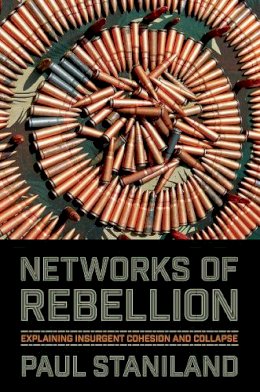7%OFF
Stock image for illustration purposes only - book cover, edition or condition may vary.
Networks of Rebellion: Explaining Insurgent Cohesion and Collapse
Paul Staniland
FREE Delivery in Ireland
Description for Networks of Rebellion: Explaining Insurgent Cohesion and Collapse
Paperback. Series: Cornell Studies in Security Affairs. Num Pages: 312 pages, 9, 9 tables. BIC Classification: JPWQ. Category: (G) General (US: Trade). Dimension: 149 x 230 x 19. Weight in Grams: 454.
The organizational cohesion of insurgent groups is central to explaining patterns of violence, the effectiveness of counterinsurgency, and civil war outcomes. Cohesive insurgent groups produce more effective war-fighting forces and are more credible negotiators; organizational cohesion shapes both the duration of wars and their ultimate resolution. In Networks of Rebellion, Paul Staniland explains why insurgent leaders differ so radically in their ability to build strong organizations and why the cohesion of armed groups changes over time during conflicts. He outlines a new way of thinking about the sources and structure of insurgent groups, distinguishing among integrated, vanguard, parochial, and fragmented ... Read moregroups.Staniland compares insurgent groups, their differing social bases, and how the nature of the coalitions and networks within which these armed groups were built has determined their discipline and internal control. He examines insurgent groups in Afghanistan, 1975 to the present day, Kashmir (1988–2003), Sri Lanka from the 1970s to the defeat of the Tamil Tigers in 2009, and several communist uprisings in Southeast Asia during the Cold War. The initial organization of an insurgent group depends on the position of its leaders in prewar political networks. These social bases shape what leaders can and cannot do when they build a new insurgent group. Counterinsurgency, insurgent strategy, and international intervention can cause organizational change. During war, insurgent groups are embedded in social ties that determine they how they organize, fight, and negotiate; as these ties shift, organizational structure changes as well.
Show Less
Product Details
Publisher
Cornell University Press
Series
Cornell Studies in Security Affairs
Place of Publication
Ithaca, United States
Shipping Time
Usually ships in 7 to 11 working days
About Paul Staniland
Paul Staniland is Assistant Professor of Political Science and Codirector of the Program on International Security Policy at the University of Chicago.
Reviews for Networks of Rebellion: Explaining Insurgent Cohesion and Collapse
Networks of Rebellion is a tour de force, providing a new theory for understanding why rebel groups have different types of internal organization, and why some hold up to the pressures of war while other collapse. The organization of rebellion is critical for understanding both patterns of violence and the ways that wars end.... It is elegantly written, well argued, ... Read moreand thoroughly researched. Staniland has clearly made a significant contribution to our understanding of rebellion. Moreover, this book is among the most policy-relevant works in political science at this juncture. It is not only a must read for scholars, but for practitioners trying to grasp the intricacies of insurgency, multiparty civil wars, and conflict resolution more generally.
Kathleen Gallagher Cunningham
H-Diplo/ISSF Roundtable Reviews
Paul Staniland is emerging as one of the most creative and influential scholars of political violence. His Networks of Rebellion will cement that reputation.... the book is a model of cogent theorization, inventive but systematic research design, and effective writing. It constitutes a substantial contribution to the scholarship on political violence and a milestone for field-based, comparative research.... Staniland's work is seminal. To understand civil war we need to understand insurgents, and to understand insurgents we need to look at the social foundations of insurgent organizations.... Networks of Rebellion is impressive empirically. The writing is clear and compelling. The book deserves the recognition it has received and is likely to continue to receive.
Scott Strauss
Perspectives on Politics
Paul Staniland's Networks of Rebellion: Explaining Insurgent Cohesionand Collapse is an important contribution to the analysis ofterror networks and their motivations.It deals with a varietyof conflicts, many of which Staniland acknowledges as being under-researched, and presents clear, understandable explanations of eachorganization under review.Through detailed case studies, Staniland highlights the subtle differences between the groups, which in other studies might be discussed collectively under particular titles such as religious extremist or maynot be discussed at all if they are smaller or do not pose the largest threat—and illustrates how subtle differences can have significant implications.
Patrick Finnegan
Parameters
Staniland's project is diligent in its methodological rigour, impressive in its empirical findings, and assertive and compelling in the theory it builds accordingly. Staniland's contribution to insurgency studies is reminiscent to how the field of critical terrorism studies emerged from scholarly dissatisfaction with the pre-existing quality of work in terrorism studies, particularly in terms of its epistemology, ontology, ethics, and praxis. His mission is ambitious, but Networks of Rebellion delivers against it and has laid the foundations of a new research agenda.
Will Carter
Small Wars and Insurgencies
With the reported emergence of some 1,000 rebel groups in the spreading Syrian civil war and the stark contrast of those that seem organized and formidable as opposed to transitory, a careful study of insurgents' structures and networks is most timely. Staniland... focuses on whether the groups are 'horizontally' or 'vertically' integrated or relatively isolated across/within locations, collaborators, and subsidiaries.... This book nicely presents a coherent overall typology complete with extenuating circumstances of contextual and political environments within which groups operate.
Choice
Staniland's three case studies serve as comparative evidence to test the author's theory. Additionally, the case studies make valuable contributions to the study of Kashmir, Afghanistan, and Sri Lanka. The author's personal field research supports each of the three case studies, which adds to their overall value and lends support to his argument. Serious students of insurgency, irregular warfare, strategy, international relations, and Southern Asia will value this groundbreaking study. Staniland's work is very much worth reading, especially for those who wish to understand insurgent organizations, particularly insurgent organizations in Kashmir, Afghanistan, and Sri Lanka.
Lt. Col. Jonathan P. Klug
Military Review
Show Less

